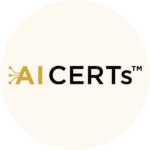
AI CERTS
4 months ago
AI Healthcare Certification: Transforming Medical Innovation
Artificial intelligence (AI) is redefining the healthcare industry, enhancing patient care, streamlining operations, and advancing medical research. From predictive analytics to robotic surgery, AI applications are paving the way for unprecedented breakthroughs. However, with this rapid adoption comes the need for professionals trained in the ethical and practical deployment of these technologies. This has led to the rise of AI healthcare certifications, equipping individuals with the knowledge and skills to navigate this transformative landscape.
In this blog, we explore the significance, components, and applications of AI healthcare certifications while addressing challenges and emerging trends.

Why AI Healthcare Certification is Essential
AI technologies are becoming integral to healthcare systems, offering solutions to longstanding issues such as misdiagnoses, inefficiencies, and high operational costs. With AI, healthcare providers can deliver better patient outcomes through data-driven insights and automation.
Bridging the Gap Between Technology and Medicine
The primary goal of an AI healthcare certification is to empower professionals to bridge the gap between complex AI technologies and their practical applications in medicine. For instance, AI is instrumental in personalizing treatment plans by analyzing patient histories and predicting outcomes. Certifications ensure that professionals understand these processes, enabling them to implement AI responsibly and effectively.
Career Advancement Opportunities
According to a study by MarketsandMarkets, the global AI healthcare market is projected to reach $45 billion by 2026. This growth highlights a surging demand for skilled professionals in roles like AI healthcare consultant, data scientist, and clinical informaticist. With an AI healthcare certification, professionals can tap into these high-demand roles, enhancing their career prospects.
Related Reading: Learn more about AI's impact on healthcare from AI in Healthcare: World Economic Forum emerging technologies report
Core Components of AI Healthcare Certification
1. AI Fundamentals for Healthcare
Participants begin with the basics of AI, exploring how machine learning, natural language processing (NLP), and neural networks contribute to medical advancements. This foundation is crucial for understanding:
- Predictive Analytics: AI models analyze patient data to predict potential health outcomes.
- Image Recognition: AI in radiology identifies anomalies in X-rays and MRIs.
- Automation: AI-powered systems handle repetitive tasks like appointment scheduling.
2. Data Privacy and Security
Healthcare generates vast amounts of sensitive data, making data security paramount. Certifications cover:
- Compliance Standards: Understanding HIPAA and GDPR regulations.
- Data Encryption Techniques: Ensuring secure data storage and transfer.
- Interoperability: Facilitating seamless integration between AI systems and electronic health records (EHRs).
3. Ethical AI in Healthcare
Ethical considerations are at the forefront of AI deployment. Participants learn to navigate:
- Algorithmic Bias: Addressing disparities in AI predictions.
- Transparency: Ensuring stakeholders understand AI-driven decisions.
- Patient Trust: Building confidence in AI tools by prioritizing privacy and fairness.
4. Hands-On AI Tools
Participants gain practical experience with tools such as:
- TensorFlow and PyTorch for developing AI models.
- Power BI for healthcare data visualization.
- Watson Health for AI-powered clinical decision support.
Applications of AI in Healthcare
1. Personalized Medicine
AI enables the customization of treatment plans by analyzing genetic information and lifestyle factors. For example, companies like Tempus use AI to deliver precision oncology treatments tailored to individual patients.
2. Medical Imaging and Diagnostics
AI algorithms have shown remarkable accuracy in diagnosing diseases like cancer and heart conditions. AI-powered imaging tools reduce diagnostic errors, offering a significant edge in early detection.
3. Operational Efficiency
Hospitals use AI for resource management, from optimizing staff schedules to automating billing processes. This allows healthcare providers to focus more on patient care.
4. Telemedicine and Virtual Health
AI chatbots and virtual assistants streamline telemedicine services, providing patients with quick, accurate responses to their queries.
Challenges in AI Healthcare
1. Data Privacy and Ethical Concerns
The healthcare industry deals with sensitive information, making data breaches a critical concern. AI models must comply with strict privacy standards while maintaining operational efficiency.
2. Integration Challenges
Integrating AI systems with existing infrastructure like EHRs can be complex and costly.
3. Lack of Standardization
The absence of universal standards for AI implementation in healthcare creates inconsistencies in adoption and effectiveness.
4. Bias in AI Models
If not properly managed, biases in AI algorithms can lead to disparities in healthcare delivery.
Emerging Trends in AI Healthcare
AI is transforming healthcare at an incredible pace, and several emerging trends are set to redefine how healthcare services are delivered and managed. Here’s an in-depth look at some of these transformative trends:
1. Explainable AI (XAI)
As AI systems become increasingly integrated into healthcare decision-making, stakeholders demand transparency in their operations. Explainable AI ensures that AI-driven decisions are interpretable and understandable by human users.
- Impact: Clinicians can validate AI recommendations, such as diagnoses or treatment plans, reducing errors and increasing trust.
- Example: AI models in radiology now provide clear visual evidence to support their findings, making it easier for doctors to understand the results.
- Future Scope: With regulatory bodies like the FDA emphasizing transparency, Explainable AI will become a standard feature in AI healthcare solutions.
2. AI-Powered Wearables
Devices like smartwatches and fitness trackers are integrating AI algorithms to monitor health metrics such as heart rate, oxygen levels, and activity patterns.
- Impact: These tools provide real-time insights, allowing for early detection of potential health issues like arrhythmias or respiratory problems.
- Example: The Apple Watch’s ECG feature has saved lives by detecting atrial fibrillation early.
- Future Scope: Advanced wearables will move beyond monitoring to therapeutic interventions, such as administering medication through integrated systems.
3. AI in Drug Discovery
AI is significantly reducing the time and cost associated with developing new drugs by identifying promising compounds and predicting their effectiveness.
- Impact: This accelerates the delivery of life-saving medications to the market, particularly for rare and complex diseases.
- Example: Companies like Insilico Medicine use AI to identify potential drug candidates in weeks rather than years.
- Future Scope: With AI, personalized medicine will become a reality, offering tailored treatments based on genetic and biological profiles.
4. AI-Blockchain Synergy
Combining AI with blockchain technology ensures secure, transparent, and tamper-proof healthcare data management.
- Impact: This enhances data security, reduces fraud, and ensures compliance with data protection regulations like GDPR and HIPAA.
- Example: Blockchain-based AI tools are being used to manage patient consent for data sharing in clinical trials.
- Future Scope: This synergy will enable seamless interoperability across healthcare systems, improving the coordination of care.
5. AI for Mental Health
AI tools are analyzing speech patterns, social media activity, and behavioral data to detect early signs of mental health conditions.
- Impact: These tools allow for timely intervention, improving outcomes for patients with depression, anxiety, or PTSD.
- Example: Woebot, an AI-powered chatbot, offers cognitive behavioral therapy (CBT) techniques to users.
- Future Scope: AI-driven mental health tools will be integrated into wearables and telehealth platforms, offering holistic mental wellness solutions.

Steps to Excel in AI Healthcare
For professionals aiming to excel in the dynamic field of AI healthcare, building a robust skill set and staying updated with the latest trends is essential. Here’s a detailed roadmap to success:
1. Master the Fundamentals of AI and Machine Learning
Understanding the basics of AI, machine learning (ML), and deep learning is critical. Focus on algorithms, data structures, and neural networks to gain a strong foundation.
- Resources: Online platforms like Coursera and edX offer introductory courses in AI and ML.
- Action: Practice coding in Python or R, which are widely used in AI development.
2. Gain Expertise in Healthcare Data Management
Data is the backbone of AI in healthcare. Learn how to manage, analyze, and secure healthcare data while adhering to privacy regulations like HIPAA and GDPR.
- Key Focus Areas:
- Data cleaning and preprocessing.
- Using tools like SQL, Tableau, and Power BI for visualization.
- Ensuring data interoperability across systems.
- Action: Work on real-world projects involving electronic health records (EHRs).
3. Develop Ethical and Regulatory Knowledge
AI in healthcare is heavily regulated due to concerns around privacy, bias, and accountability. Familiarize yourself with the ethical implications and legal requirements of deploying AI in medical contexts.
- Key Areas:
- Bias mitigation in AI algorithms.
- Understanding compliance standards such as FDA guidelines for AI tools.
- Transparency in AI decision-making.
- Action: Attend workshops or webinars focused on AI ethics and governance.
4. Build Hands-On Experience with AI Tools
- TensorFlow and PyTorch for building machine learning models.
- Watson Health for clinical decision support.
- Microsoft Azure AI for deploying scalable AI solutions.
- Action: Participate in hackathons or contribute to open-source projects to showcase your skills.
5. Stay Updated with Industry Trends
The field of AI healthcare is evolving rapidly, with new tools and techniques emerging regularly. Stay informed by:
- Following industry leaders on LinkedIn and Twitter.
- Reading research papers and case studies.
- Subscribing to publications like Nature Medicine or TechCrunch Healthcare.
- Action: Join online communities and forums to network with professionals and exchange ideas.
6. Pursue Advanced Certifications and Courses
Certifications tailored to AI in healthcare provide specialized knowledge and improve your credibility in the field.
Recommended AI Healthcare Certifications:
1)AI CERTs - AI+Healthcare™
AI CERTs AI+ Healthcare certification offers a comprehensive exploration of technologies like machine learning, deep learning, and neural networks within the healthcare domain. These tools are utilized to enhance diverse areas including medical imaging, diagnostics, treatment planning, patient monitoring, and healthcare administration.
Use the coupon code NEWCOURSE25 to get 25% OFF on AI CERTS’ certifications. Don’t miss out on this limited-time offer!
2)Stanford University - AI in Healthcare Specialization
Stanford’s specialization dives into the impact of AI on healthcare and teaches the application of AI in diagnostics and treatment.
Link to Stanford AI in Healthcare Course
7. Collaborate Across Disciplines
AI healthcare requires collaboration between technologists, clinicians, and policymakers. Build strong communication and teamwork skills to bridge these disciplines effectively.
- Action: Work on cross-functional teams to develop comprehensive AI solutions.
Excelling in AI healthcare requires a combination of technical expertise, ethical awareness, and industry insights. By mastering these skills and staying ahead of emerging trends, professionals can drive meaningful change in patient care and healthcare innovation. Whether it’s leveraging AI for early diagnosis or ensuring the security of patient data, the opportunities are limitless for those equipped with the right knowledge and tools.